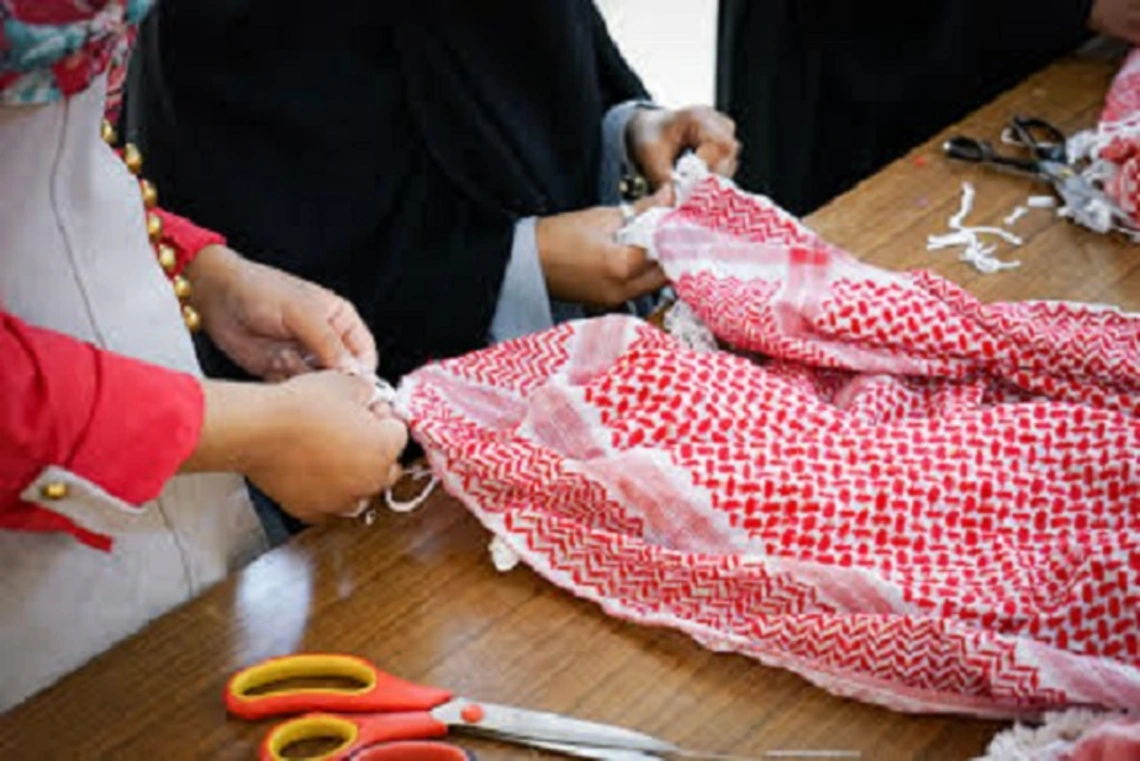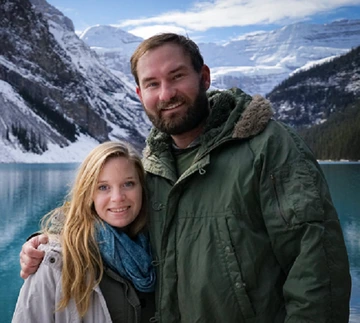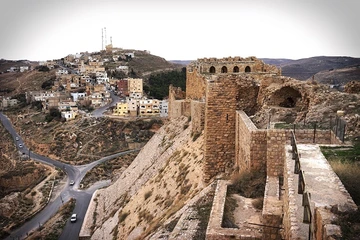Q&A with Alison Dixon-Udall on “Rebuild for Peace”

Alison Dixon-Udall, who completed the UArizona MA in Human Rights Practice in 2019, is a human-rights and trauma informed practitioner, passionate about providing education and other positive, reconstructive pathways to empower vulnerable populations. In the photo below, Alison is pictured with her husband Christopher Udall on a trip to the Canadian Rockies. This Q&A was conducted by Prof. Raymond Smith.

Q: Alison, you are Vice President of the Board of Directors for the organization Rebuild for Peace. Can you tell us about the organization and your role in it?
Rebuild for Peace is a nonprofit organization that provides economic growth and capacity building opportunities to marginalized communities, focusing on vocational education, entrepreneurship, and peace-building initiatives. The organization approaches projects from a community-centered lens, working closely with local businesses to identify skill gaps and industry demands, as well as employing local experts to instruct the chosen vocational courses.
I began my work with Rebuild for Peace in 2017 as the Vice President/Director of Content Strategy, helping my now husband with the start-up of the organization, and have since transitioned to the Board of Directors, continuing to oversee content development. Over the years, I have worked both in the field and in an administrative capacity. My primary responsibility has been to grow the organization through marketing and fundraising strategies, including designing a volunteer ambassador program, developing a peace-building curriculum, and planning social media marketing campaigns.
Q: Rebuild for Peace's projects started in the Kingdom of Jordan, operating vocational learning centers and facilitating leadership trainings. Please say more about that work and your involvement with it.
The first projects launched by Rebuild for Peace were in the Kingdom of Jordan in 2017, a decision that was influenced by the socioeconomic climate of the country and the instability that was increasing due to job scarcity and a competition for resources, intensified by the refugee influx. In some regions, the rate of recruitment to violent extremist groups was even reported to be on the rise, which local leaders attributed to the lack of opportunity. We recognized the value of providing educational and economic opportunities so, in collaboration with our Jordanian partners, we established vocational learning centers in affected communities around the Kingdom, particularly in rural areas where access to transportation was limited. The three-month courses were offered to both refugees and Jordanian youth, providing vocational training based on skill-gaps identified by the community, ranging from clothing manufacturing to carpentry. Additionally, entrepreneurship, peacebuilding, and leadership trainings were incorporated into the curriculum and a community service project was required prior to graduation, as seen in the Karak Castle Rebuild video. (See photo of Karak Castle below.)
During this time, I personally attended several of the learning centers and interacted with many of the students. I assisted in collecting evaluation data, personal testimonials, and other materials that were then used to create the organization's blog, social media presence, stewardship reports, fundraising slidedecks and other content that has helped the nonprofit grow and fund future projects. Since its inception, Rebuild for Peace has established 15 vocational learning centers, resulting in 250 graduates.
Q: Rebuild for Peace's work has extended to youth residing in the Za’atari Refugee Camp and refugees living near the Syrian-Jordanian border. Those sound like places where there are tremendous needs. How does Rebuild for Peace make an impact there?
Several years ago, an international NGO provided bicycles to Za'atari Refugee Camp as a transportation solution to allow residents to visit family and friends on the other end of the sprawling settlement often referred to as "Jordan's fourth largest city". However, over time the bicycles fell into disrepair and no one was equipped with the skills to restore them. Rebuild for Peace was granted permission to facilitate a bicycle repair training program directed to camp residents, who have in turn used their skill to teach others residing in the camp. Around the same time, Rebuild for Peace established two vocational training centers in the North of Jordan, along the border of Syria. The majority of the students were female Syrian refugees who had fled their homes due to the armed conflict. Forty students completed the three-month vocational training.

Q: How does this work connect with your studies in the MA in Human Rights Practice at the University of Arizona?
After serving with the organization for a couple of years, I decided to attend the Human Rights Practice program, in order to increase my knowledge of the nonprofit sector and gain practical tools for further advocacy and development. Many of the skills I learned in the program have helped me to further the impactful work of Rebuild for Peace and other humanitarian initiatives, such as proposal writing, content/video creation, and curriculum design. In addition, Rebuild for Peace has partnered with the University of Arizona to offer opportunities to Russian and Ukrainian students who desire to practice human rights law.
Q: Beyond your work with Rebuild for Peace and the MA program, can you tell us a little more about yourself and your experiences?
After graduating with my MA in Human Rights Practice, I attended the Harvard Program in Global Mental Health and Refugee Trauma Recovery, presented a TEDx talk on Everyday Resilience, and continued my work in nonprofit development. These experiences and more have inspired in me an interest to create trauma-informed educational training materials that lend themselves to humanitarians and field practitioners who work closely with sensitive populations affected by war and conflict. My husband and I also built an off-grid tiny home in Northwest Montana to offset monthly living expenses during the start-up phase of the nonprofit, which we have now sold. Beyond my professional interests, I enjoy traveling, hiking, biking, and paddleboarding with my husband, Christopher, Brittany Spaniel, Theo, and Aussie Collie, Freckles.

